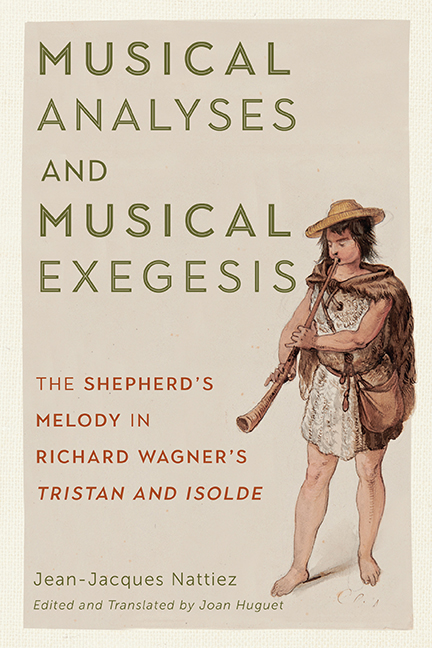 Musical Analyses and Musical Exegesis
Musical Analyses and Musical Exegesis Book contents
- Frontmatter
- Dedication
- Contents
- Foreword to the French Edition
- Preface
- Introduction: The English-Horn Solo, My Approach, and Models of Analysis and Musical Meaning
- Part I Immanent Analysis of the English-Horn Solo’s Musical Structures
- Part II Esthesic Analysis
- Part III Poietic Analysis
- Part IV Hermeneutics
- Conclusion: The Validity of Structural Analyses and Interpretations
- Bibliography
- Index
Foreword to the French Edition
Published online by Cambridge University Press: 02 June 2021
- Frontmatter
- Dedication
- Contents
- Foreword to the French Edition
- Preface
- Introduction: The English-Horn Solo, My Approach, and Models of Analysis and Musical Meaning
- Part I Immanent Analysis of the English-Horn Solo’s Musical Structures
- Part II Esthesic Analysis
- Part III Poietic Analysis
- Part IV Hermeneutics
- Conclusion: The Validity of Structural Analyses and Interpretations
- Bibliography
- Index
Summary
Jean-Jacques Nattiez completed all of his studies in France: first in his birth-place of Amiens, then at the Universitéd’Aix-en-Provence, and finally at Paris-VIII, culminating in a doctoral degree in the then new and little-studied field of musical semiology (1973).
The Universitéde Montréal stole him from us in 1970. He began his career there as a researcher in the department of linguistics, and he was then appointed professor of musicology in the Faculty of Music in 1972. Today, he is professor emeritus at this institution. In the 1970s, he also served as the director of a music semiology research group; this group's work is clearly and eloquently extended in the present study.
In spite of his university duties, Nattiez has remained involved in a variety of other projects. This is not in and of itself the source of his absolute uniqueness, since many eminent academics edit musicological collections and research a wide variety of topics. What makes Jean-Jacques Nattiez unique in the musical world is that for him, musicology is not narrowly focused on the past. This traditional view of musicology certainly has its uses, but it often seems to forget both the present day and other cultures.
When studying Nattiez's publications list, it is difficult to imagine that such a variety of subjects could be treated by a single author. For example, it includes a study entitled Wagner androgyne, and another called Proust musicien (Proust as Musician). In addition, there are speculative works, including Musicologie générale et sémiologie (Music and Discourse) and De la sémiologie à la musique. In addition, he has curated recordings of music from oral traditions, including Chants et Jeux des Inuit, Chants des Aïnou, and Chants des Baganda de l’Ouganda. I will also mention that he edited many of my own writings in Points de repères (Orientations), Regards sur autrui, and Leçons de musique (Music Lessons: The Collège de France Lectures). Without his diligent assistance, many of these texts would have remained hidden away in my files.
Jean-Jacques Nattiez is also active in contemporary musical life. He edited the series Musique/Passé/Présent for Christian Bourgois (Paris), as well as the journal Circuit: Revue nord-américaine de musique du XXe siècle in Montreal. Later, he served for a decade as editor of the monumental Musiques: Encyclopédie pour le XXIe siècle. This work was published in five volumes by Einaudi in Italy and Actes Sud in France.
- Type
- Chapter
- Information
- Musical Analyses and Musical ExegesisThe Shepherd's Melody in Richard Wagner's <I>Tristan and Isolde</I>, pp. xi - xiiPublisher: Boydell & BrewerPrint publication year: 2021


